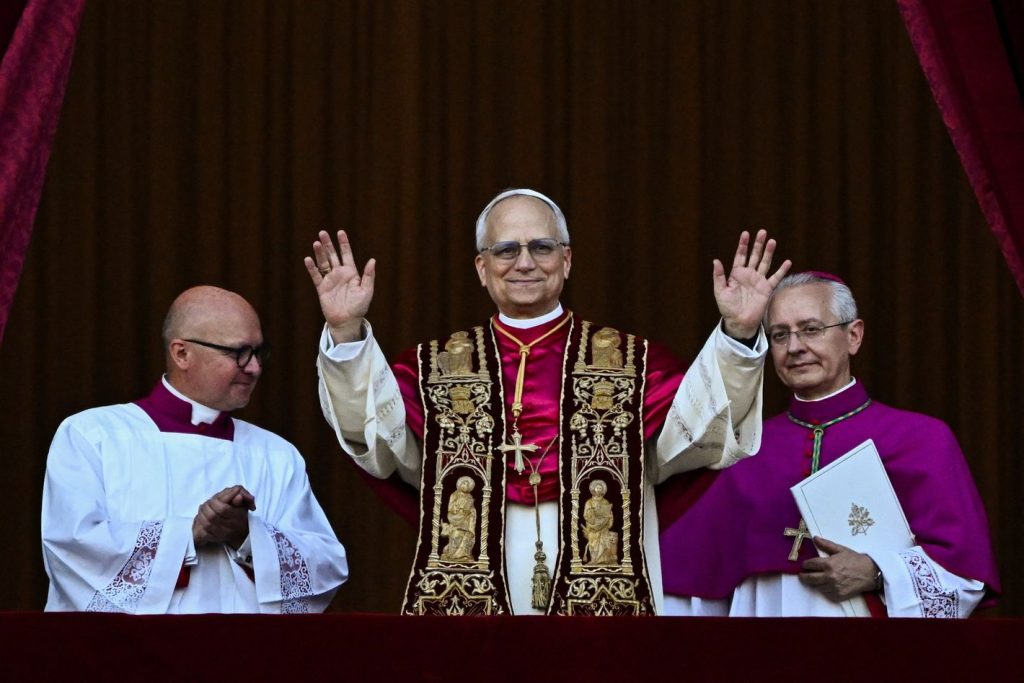Photo: Dylan Martinez/Reuters
Just a day after the College of Cardinals convened to select a new pontiff following the death of Pope Francis, on Thursday white smoke appeared from the roof of the Sistine Chapel. Since the conclave was relatively short, many assumed one of the longtime front-runners, Vatican secretary of State Pietro Parolin or Cardinal Luis Antonio Tagle, had been selected. Instead, the cardinals pulled a surprise, choosing American-born Robert Prevost, who was Pope Francis’s chief adviser in choosing bishops. Prevost’s views on key issues facing the Church are believed to be very much in line with his predecessor, though perhaps without Francis’s outspokenness or personal flair.
The new pope took the name of Leo XIV, which could be an indication of the legacy he hopes to leave. It’s a pretty clear shout-out to Leo XIII, the late 19th-century pontiff whose encyclicals laid out a template for a distinctively Catholic social-justice doctrine that opened the Church to more active participation in democratic politics and governance and efforts to improve conditions for workers.
While no one was expecting an American pope (it has now been over four decades since an Italian was elected to the pontificate), Prevost’s American origins should not mislead anyone about his uniquely global perspective, as National Catholic Reporter’s Christopher White noted in his pre-conclave profile of him:
Though he may be American by birth, he has spent only a third of his life in the United States, instead spending much of the rest of it in Europe and Latin America. …
In 1985, Prevost joined the Augustinian mission in Peru in 1985, becoming part of the religious order inspired by St. Augustine that seeks to find a balance of “love and learning.” Augustinian friars lead semi-monastic lives and are engaged in a range of pursuits, such as education or prison work.
At age 30, Prevost went to work in Peru, serving there until 1999, with a brief stint back in Chicago in 1987 to work as pastor for vocations and director of missions for its Augustinian province.
His elevation to the highest levels of the Church hierarchy occurred entirely under Francis, who made him Bishop of Chiclayo, in northern Peru. Francis lifted him to his current position in the Roman Curia just a little over two years ago.
The very conservative College of Cardinals Report suggested that Leo XIV can be expected to pursue the same agenda of softening Church practices toward previously excluded believers for which Francis was known. Though Leo may pursue this goal in a less confrontational way:
On key topics, Cardinal Prevost says little but some of his positions are known. He is reportedly very close to Francis’ vision regarding the environment, outreach to the poor and migrants, and meeting people where they are. He said last year “the bishop is not supposed to be a little prince sitting in his kingdom.”
He supported Pope Francis’ change in pastoral practice to allow divorced and civilly remarried Catholics to receive Holy Communion. Prevost appears somewhat less favorable to currying favor with the LGBTQ lobby than Francis, but he showed mild support for Fiducia Supplicans [Francis’s encyclical opening the door to blessings of same-sex unions]
Like Francis, Leo XIV doesn’t enter the pontificate with a perfect record on the high-profile issue of transparency and restitution for the victims of clerical sex abuse, as the Catholic outlet The Pillar reports:
Among the cases flagged by advocates are charges that Prevost’s former Diocese of Chiclayo has been accused of mishandling clerical allegations made by three sisters, who say that in 2022, when they reported abuse in the diocese, Prevost failed to open an investigation into the claims.
They also charge that documentation sent to Rome on the case was purposely designed to look inadequate so as to prevent action on the case.
It would probably behoove the new pope to make a strong gesture on this issue now that he has emerged from the relative obscurity of the Curia.
While his quick election was a surprise, the new pope was certainly helped by his involvement in selecting some of the cardinals (he supervised the choice of 20 of the 133 who elected him) and his familiarity with others as Francis’s deputy in episcopal matters. And his reputation as a “global” pontiff is enhanced by his mastery of languages, as he demonstrated in his initial words as pontiff:
Prevost is a polyglot who speaks English, Spanish, Italian and Portuguese. He also reads Latin and German. His fluency in Spanish, in particular, has helped him forge strong bonds with Latin American communities over decades of ministry and mission work. …
Though he is a native English speaker, Pope Leo XIV delivered his first public remarks in Italian and Spanish, languages he has used throughout much of his ecclesiastical career.
To unite and carry forward this community of 1.4 billion people, Leo XIV will need all his gifts and perhaps much of his predecessor’s courage and willingness to push Catholics to deal with difficult questions. At the age of 69, he could have a long and eventful pontificate (Francis was 76 when elected; his predecessor, Benedict XVI, was 78). But right now, his relatively low-profile background means he can be as surprising as his election.

